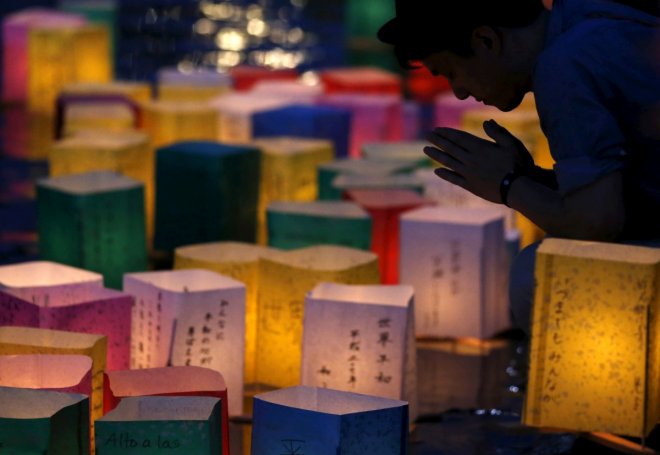
For the first time in several years, Japan observed the Hiroshima Day on August 6, 2017 without the controversy on Yasukuni shrine visit by political leaders eclipsing the spirit for peace around the world.
People gathered at the Hiroshima memorial at 8:15 a.m. and observed a moment in silence paying respects for those who were killed when the first atomic bomb "Little Boy" was dropped on Hiroshima by a U.S. bomber on Aug. 6, 1945, killing an estimated 140,000 people within few months. As of March 2017, the death toll of Hiroshima victims called 'hibakusha' stood at 164,621.
A second atomic bomb was dropped on Nagasaki three days later on Aug. 9, 1945 and Japan surrendered on August 15, 1945 bringing an end to World War II.
Hiroshima mayor Kazumi Matsui called on the Japanese government to sign the treaty banning nuclear weapons and demanded more compassionate assistance to aging hibakusha, as well as to "the many others also suffering mentally and physically from the effects of radiation."
Prime Minister Shinzo Abe, however, avoided any controversy saying, "For us to truly realize a 'world without nuclear weapons,' the participation of both nuclear weapon states and non-nuclear weapon states is necessary."
Otherwise, the day passed off peacefully without the usual controversy of political leaders visiting the Yasukuni shrine where World War II military leaders of Japan are enshrined. The visits often evoked protests from erstwhile war victim nations of Asia including North and South Koreas, China and the Philippines.
A Mainichi Shimbun survey conducted on Aug. 3 and Aug. 4 showed that half of the participants supported visits by the prime minister and cabinet colleagues to Yasukuni shrine while 32 percent opposed the visits which had often sparked anger among the victims of World War II in Asia. The survey highlighted that there is no major change in public perception from a 2015 survey that had put the figures at 55 percent and 31 percent respectively.









